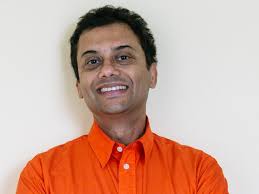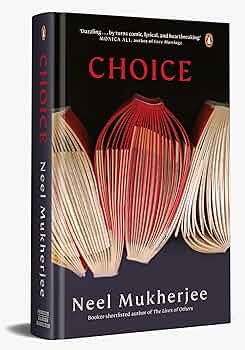I love an afternoon read
Hold onto your chai and crackers! In my case, it’s a cup of Orange Pekoe that sweetens an afternoon read. Neel Mukherjee’s “Choice” is here to take you on a twisted ride through the labyrinth of human decisions and self-deceptions. Remember that V.S. Naipaul quote from “In a Free State”? The one about the lies we tell ourselves being the ones that truly punish us? Well, Mukherjee doesn’t just remember it; he weaves it into a dazzling tapestry of narratives that will leave you pondering your own life choices (and possibly questioning your last few bedtime reads).
Ayush: The Man, the Myth, the Control Freak
In the opening act, we meet Ayush, an Desi man navigating the choppy waters of a London publishing house where he’s the token diversity hire. Seriously, the place is called Sewer – subtle, right? Ayush is your classic overachiever, juggling a high-pressure job, a family, and a social conscience that makes Greta Thunberg look like a slacker. His husband, Luke, is the steady yin to Ayush’s obsessive yang, fretting over Ayush’s attempts to expose their kids to the ‘harsh realities’ of the world. Ever swapped a bedtime story for a slaughterhouse documentary? Ayush has. He’s also redirected a cool £200,000 from their kids’ education fund to climate change charities. Because why not?
Ayush’s life is a perpetual tightrope walk between societal expectations and personal convictions. His mental health teeters on the brink until he stumbles upon a manuscript that might just save his sanity. And here’s where Mukherjee’s genius shines: Ayush’s life, with all its chaos, becomes a mirror for the reader. We see a man desperate to script his own story but finding solace in the narratives of others.
Emily: The Accidental Witness
Next up is Emily, the academic who gets caught up in a hit-and-run that’s foggier than a London pea-souper. Emily’s cab ride from hell, courtesy of a harried Eritrean driver, leaves her grappling with fragmented memories and a moral quandary. Should she report the incident or wait for her memory to clear? Mukherjee’s prose here is like watching a suspense thriller unfold in slow motion. Emily’s indecision blooms into a fate she can’t escape, and we’re left biting our nails, wondering if she’ll ever act.
Emily’s narrative is a masterclass in deferred choices. Her guilt over the accident propels her into a writing frenzy, finally giving her something substantial to write about. It’s the ultimate irony: a moment of potential tragedy ignites her creative spark, proving that sometimes, our most significant decisions are the ones we don’t even realize we’re making.
Moo-ving Misadventures in Bangladesh
Finally, Mukherjee takes us to Bangladersh, where a family receives a cow as a “grand, majestic gift” from a well-meaning NGO. Spoiler alert: it’s not the gift they hoped for. The cow needs water, straw, and care – not exactly abundant during monsoon season. What starts as a boon quickly turns into a burden, with the family’s attempts to manage their new asset spiraling into a tragicomic farce.
Mukherjee’s portrayal of this rural family’s struggle is a blend of dark humor and poignant realism. It’s a reminder that sometimes, the choices we think will save us end up being the ones that tether us to new forms of hardship. The cow, symbolic of well-meaning but misguided interventions, becomes a metaphor for the complexities of aid and the unintended consequences of even the best-laid plans.
The Verdict: A Rollercoaster of Choices
“Choice” is a book that juggles multiple narratives with the finesse of a circus performer, all while maintaining a sharp, observant eye on the human condition. Mukherjee’s prose is cool and precise, making the reader feel like a trusted confidant to his characters’ most intimate thoughts and struggles. Whether it’s Ayush’s desperate grasp for control, Emily’s reluctant inaction, or the rural family’s bovine woes, each story resonates with a unique blend of humor, pathos, and stark realism.
In the end, Mukherjee’s novel is a heartbreaker and a joy, a mirror held up to our own lives, reflecting the often absurd consequences of our choices. So, if you’re ready for a literary journey that’s as thought-provoking as it is entertaining, “Choice” should be at the top of your reading list. Just maybe keep a glass of milk handy – and pray it doesn’t sour.
THE REVIEWER, FRANK KRISHNER, IS AN ACCOMPLISHED WRITER AND COMMUNICATOR BASED IN PATNA
Choice
By Neel Mukherjee
Penguin Hamish Hamilton
Pages: 320
Price: Rs.699



